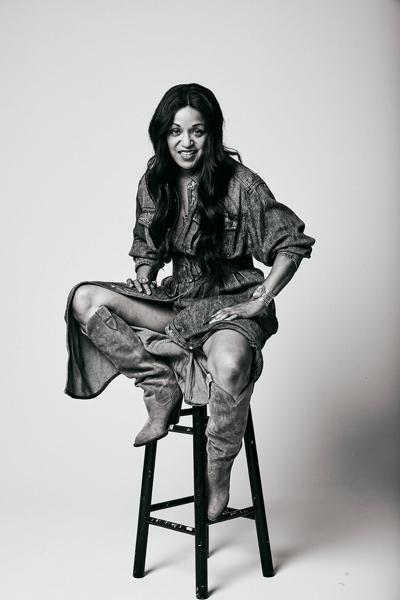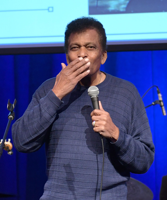
Danielia Cotton
Danielia Cotton is a veteran of New York’s rock ’n’ roll scene, possessed of an inimitable sense of grit and glamour to go with the rich, powerful voice she’s recorded on a wide array of gospel, R&B and rock songs. Cotton grew up one of very few Black people in the hinterland of rural New Jersey, and she was surrounded by music; both circumstances played big roles in shaping her identity. Though country wasn’t a primary influence in her early days, her grandfather’s love for the late Charley Pride — far from the first Black country singer, but without a doubt the first Black country superstar — made a lasting impact, and she’s gearing up to release a tribute in the form of her EP Charley’s Pride: Songs From a Black Cowboy Vol. I. Her version of “Roll on Mississippi” is sublimely gentle, and her take on “Kiss an Angel Good Morning” is raw and soulful, like something that would make The Rolling Stones envious they didn’t think of first. Ahead of two shows in Music City on Friday — first at 3rd and Lindsley for WMOT Roots Radio’s Finally Friday program and later at Miss Zeke’s Juke Joint — the Scene caught up with Cotton.
How has the response been for your Charley Pride covers?
We are going to be releasing the full EP in August called Charley’s Pride. It’s a tribute to Black country music. I grew up in a farming town in New Jersey called Hopewell, and there were not many Black people. My grandfather hid his Charley Pride album underneath his bed, because back then it wasn’t popular for a Black man to be into country. When I went to go interview my grandmother about the whole thing, she was like, “It was my album, and he took it from me!” Most people don’t know that, next to Elvis, [Pride] sold the most albums on RCA, ever. He was the first Black man to headline at the Grand Ole Opry. I recorded some Charley Pride covers years ago, so I thought to go back and make an EP to celebrate him.
You’ve used music as a means of better understanding your identities.
To grow up as a little Black kid in the New Jersey farmlands, it was not very diverse. But rock music sounded the way I felt. I wanted to have blond hair and blue eyes, like every one of my friends in my high school. My friends were all outcasts in their ways. We loved each other, and that music just sounded like everything I felt, and it wasn’t what a typical Black kid would have probably listened to — but I wasn’t around a bunch of Black kids listening to Donny Hathaway or Stevie Wonder or Michael Jackson. I was around these kids, and when their music came on, they loved it for one reason, and I loved it because it somehow expressed my anger and my discontent.
How did you get involved with music?
My mom has 10 siblings: six girls, four boys. The six girls were in an a cappella gospel group. I joined when I was around 13. I sing in it to this day. My aunts, Jeannie Brooks and Carol Brooks, were both background singers. Carol was on the road with Southside Johnny. They eventually did background [vocals] for Bon Jovi. They also sang jazz and pop and rock. My mom was also a jazz singer. I come from a musical family by nature.
What are you most excited about for your two shows in Nashville?
They’re going to be awesome. I went into my repertoire to find songs that I thought that audience would be open to, and it was a lot easier than I thought — a lot more Southern-rock-influenced songs than I realized. It’s funny: We’re more alike than we think, even with people that we feel we have nothing in common with. There’s always something that can connect you. You just have to find it.








